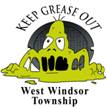West Windsor Township’s Best Management Practices Grease Control
in Retail Food Establishments Management

- Train, monitor and remind employees of proper grease control practices.
- Have grease interceptor cleaned before the grease and solids layers combined occupy 25% of the depth of the grease interceptor. Inspect tanks regularly to ensure available storage capacity.
- Ensure food waste is placed in trash NOT down the drain! Food particles in the waste stream will allow grease globules to bind together and clog the sewer system.
- Mandate the “Dry Wiping of Grease” from dishware, pots, spills, waste containers and equipment. Use rubber spatulas freely and paper towels when necessary for dry wiping. Avoid wet spraying as the sole method of pre-wash.
- Provide a spill kit for dry cleanup of grease spills and place waste in the trash.
- Provide strainer baskets in all drains likely to catch food waste.
- Do not allow flushing of grease or food waste into toilets, floor drains, or storm sewers.
- Provide grease waste receptacles that are securely covered, conveniently located and placed upon a non-absorbent surface. Inspect often to prevent overflow.
- Capture wastewater from hood cleaning before it is discharged into floor drains, troughs or utility sinks. Dispose of as grease waste. If a professional service is used, discuss procedures to ensure compliance.
- Recycle golden oil from fryers and grease recovery devices.
- Supervise professional grease interceptor pumping and cleaning services to ensure compliance.
- Remove food grinders and disposals from retail food establishments.
- Periodically utilize a licensed professional to inspect grease interceptors to ensure the integrity and continued proper operation.

